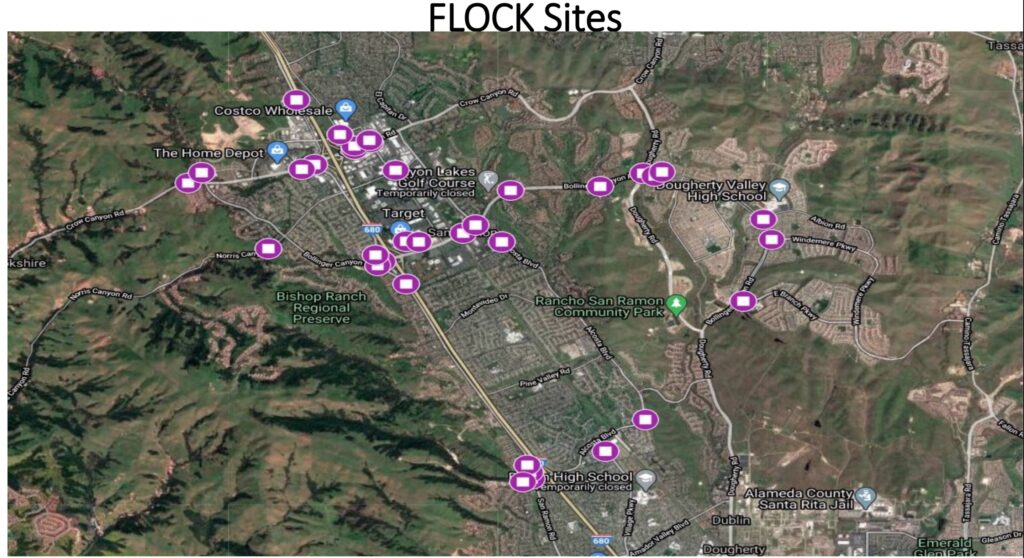BART has filed their annual surveillance report on the 7 surveillance technologies in use on the Bay Area Rapid Transit System.
San Ramon Approves Massive Surveillance Increase
San Ramon, a small city in Contra Costa County with a very low crime rate, approved spending more than $1.2 million to blanket the city in automated license plate readers (ALPRs) and surveillance cameras at its April 28, 2020, meeting.
The amount includes 12 stationary ALPRs at five locations from Vigilant Solutions, 35 ALPRs from Flock Safety and 46 Avigilon surveillance cameras. Eight police vehicles are already equipped with Vigilant ALPRs and Flock Safety cameras are already installed at the intersection of Camino Ramon and Crow Canyon and the northeast intersection of Crow Canyon Boulevard and Crow Canyon Place.

PVE Funding Cut From State Budget
The #NoPVEinCalifornia coalition was successful in persuading the CA State Legislature to remove funding to staff the Preventing Violent Extremism program (renamed as Creating Safer Communities).
The state program, modeled after the federal Countering Violent Extremism, doles out grants to social service and educational institutions to try to identify incipient terrorists in their midst.

The NoPVEinCA Coalition celebrates the critical step taken by the state Legislature and the Committee on Budget to refuse state funding for PVE and CSC, surveillance programs modeled after the DHS and FBI’s “Countering Violent Extremism” (CVE) program, in response to community demands amplified and supported by the Coalition’s work.
1st Municipal Ban on Predictive Policing in Santa Cruz

The Central California city of Santa Cruz became the first city in the nation to ban the use of predictive policing software by their police department. The City Council voted 7-0 to end the use of the software by ordinance due to its reinforcement of racial bias in policing.
The ordinance, which was introduced by Mayor Justin Cummings, the first Black mayor in Santa Cruz history, went into effect in a city that was one of the first adopters of the technology.
Fighting Local Surveillance: A Toolkit
Getting a surveillance transparency ordinance or a facial recognition ban passed in your town can seem like an overwhelming task. It’s not. You can do it!
Oakland Privacy and ACLU of Northern California sat down to write a step by step guide based on the dozen ordinances in place across the country, including 8 in the San Francisco Bay Area.

This free guide includes loads of advice on coalition-building, public education, strategy, research, messaging and advocacy and samples of useful documents.
Oakland Privacy gets asked for these kinds of things all the time. Ask no more. Download!
(You can still call or email us, but now … instant gratification).
Oakland Privacy Sues Vallejo Over Stingray Purchase
by Mike Katz-Lacabe
Update 6/1/2020 Oakland Privacy and resident-plaintiffs Solange Echeverria and Daniel Rubins sued the City of Vallejo over their recent stingray purchase. In the complaint, Oakland Privacy states that the purchase violated state law by voting to acquire the cell phone interceptor without a city council review of the use policy and by not allowing public input into the stingray use policy from city residents.
The complaint also states the police-department-produced policy is inadequate. It does not specify which departmental job titles may use the stingray and access its data and it allows use of the device without a judicial warrant whenever there is a threat of bodily injury of any kind.
